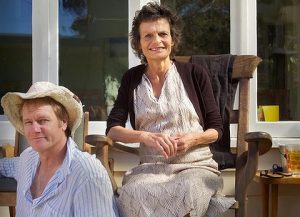Tonight I learned that Australian filmmaker Sarah Watt died earlier this month. Sometimes I’m a little slow on the uptake – it was more than three weeks ago. She leaves behind a body of award-winning work, a loving husband, and two teenage children. This moving article in The Age features a photograph I will reproduce below until such time as I’m asked to remove it. (Photo credit: Simon Schluter.)
When I first saw this picture of husband and wife, I stopped breathing. Just for a moment. It is an almost perfect replica of a photograph a friend took of John and me within a few weeks of his death, which is now seven years ago. Sarah’s grin, her relaxed pose, the genuine friendliness emanating from her face. The skeleton waiting in its wings. And there’s her husband beside her, similarly v-necked and relaxed, wearing a hat to keep the melanoma away. That knockabout character we know from his TV roles and books is not in this photograph. In its place is a man dreading the inevitable, hoping he might have a faint grasp of what her absence will be like, and now facing the awful knowledge that nothing prepares you for such a loss, no matter how long your beloved has been defending herself from her diagnosis.
As someone who watched her husband succumb to the same type of secondary bone cancer that just stole Sarah Watt, I can only offer William McInnes my deepest condolences, and my empathy. I remember the disbelief, the howling, the physical weakness, the anger. I remember not wanting to go on for one more minute. Somehow I went on.
I can’t imagine what grief is like for William McInness or for either of his children. I can only know what it was like for me. John and I had no children – “it’d be too sad not to be able to pick them up,” he always said when we discussed it – and in the years since I’ve often wondered whether it’s better or worse to be widowed with children, or without. The answer is that there is no better. There is no worse. The loss of your spouse destroys you and it also destroys “you”, that sense of yourself that, however impaired or ridden with doubts or insecurities, helps you to steer a course through daily life. When you’re lucky enough to be in a loving relationship, there are two pairs of hands guiding that rudder, to an extent that neither of you ever suspected.
Learning to steer again took me many years. Everyone grieves in different ways. I hope that despite this family’s public loss, they can find the privacy they need. One helpful thing John repeatedly said to me in the weeks before he died was that he wanted me to be happy. It took years for me to hear him. As I said, sometimes I am a slow learner.
(For anyone struggling with the loss of a spouse who is looking for something to read that might help: I wrote this book and, more recently, this essay on subjects relating to what I’ve written about here. I include the links because I know from the emails I receive from complete strangers that my book has helped people.)
